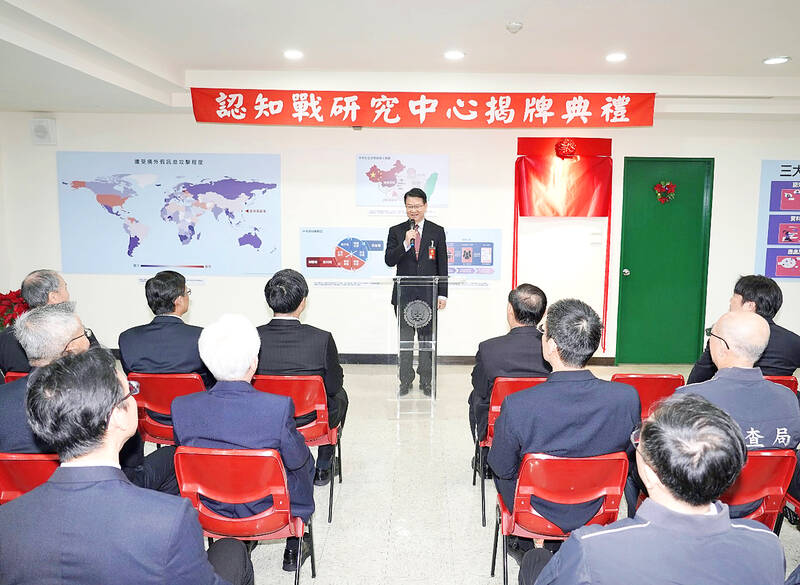The Ministry of Justice Investigation Bureau (MJIB) yesterday inaugurated the Cognitive Warfare Research Center dedicated to studying the threat of online disinformation to Taiwan’s democracy and security.
Foreign hostile forces produced and disseminated forged videos, fabricated news and doctored images to stir up controversy to influence the outcome of Saturday’s presidential and legislative elections, MJIB Director-General Wang Chun-li (王俊力) said at the bureau’s headquarters in New Taipei City’s Sindian District (新店).
Methods to combat these new forms of computer-based information warfare are needed, after the nation came under escalating attacks in recent months with disinformation about government policies, national defense, foreign affairs and cross-strait relations, as well as issues relating to the economy and people’s livelihoods, Wang said.

Photo courtesy of the Investigation Bureau
The materials were created by cyberarmies and content farms, then circulated on social media and messaging platforms via trolls, zombie accounts and online influencers, Wang said.
“People have reported that they mainly targeted government agencies, political parties, and certain officials and legislators, using defamation and smear tactics to mislead the public, sow doubt and erode public confidence in the government,” he added.
The new center combines the resources and professional expertise of the MJIB’s Information Security, Cross-Strait Research and Internal Security Investigation units, Wang said.
“Taiwan has experienced more intense and frequent attacks by foreign hostile forces, aiming to subvert Taiwan’s democracy, undermine trust in the government, and enhancing threats and dangers to national security,” Minister of Justice Tsai Ching-hsiang (蔡清祥) said in his address.
The center is composed of three divisions: data compilation and research, analysis of cognitive warfare targeting Taiwan and a swift response unit to combat fake news, Wang said.
Cyberexperts will constantly monitor data to root out fake and zombie accounts, work in real time to contact proprietors of social media platforms to remove fake news and videos, and publish statements to inform the public.
Separately, the Central Election Commission (CEC) yesterday confirmed that it had set up a communication channel with TikTok and had reported 33 suspected fabricated videos related to the elections.
CEC officials added that they have filed for judicial investigation of 25 videos alleging voter fraud to cast doubt on the election outcome.
These videos have been doctored and provide no concrete proof of election rigging, the CEC said, adding that representatives from major parties and media outlets were present during the vote count.
Meanwhile, Taiwan Statebuilding Party leader Wang Hsin-huan (王興煥) blasted the Democratic Progressive Party’s (DPP) “ostrich hiding its head in the sand” approach to fake news and cyberattacks from China.
“Over the years, we have repeatedly warned the DPP government about China’s expansion and growing influence in using TikTok videos and social media platforms to destabilize Taiwan’s democracy, create social strife and sow division within Taiwan,” Wang Hsin-huan said.
“Unfortunately, our sound warnings and requests to ban TikTok and Chinese-based social media and messaging apps went unheeded. We saw the Ministry of Digital Affairs and its head, Audrey Tang (唐鳳), the National Communications Commission, the Ministry of Culture and even our national security agencies faced such grave danger with a lax attitude ... taking no action on these serious threats to our nation,” he said.
Additional reporting by Lee Wen-hsin

The Central Election Commission has amended election and recall regulations to require elected office candidates to provide proof that they have no Chinese citizenship, a Cabinet report said. The commission on Oct. 29 last year revised the Measures for the Permission of Family-based Residence, Long-term Residence and Settlement of People from the Mainland Area in the Taiwan Area (大陸地區人民在台灣地區依親居留長期居留或定居許可辦法), the Executive Yuan said in a report it submitted to the legislature for review. The revision requires Chinese citizens applying for permanent residency to submit notarial documents showing that they have lost their Chinese household record and have renounced — or have never

A magnitude 5.6 earthquake struck off the coast of Yilan County at 12:37pm today, with clear shaking felt across much of northern Taiwan. There were no immediate reports of damage. The epicenter of the quake was 16.9km east-southeast of Yilan County Hall offshore at a depth of 66.8km, Central Weather Administration (CWA) data showed. The maximum intensity registered at a 4 in Yilan County’s Nanao Township (南澳) on Taiwan’s seven-tier scale. Other parts of Yilan, as well as certain areas of Hualien County, Taipei, New Taipei City, Taoyuan, Hsinchu County, Taichung and Miaoli County, recorded intensities of 3. Residents of Yilan County and Taipei received

Taiwan has secured another breakthrough in fruit exports, with jujubes, dragon fruit and lychees approved for shipment to the EU, the Ministry of Agriculture said yesterday. The Animal and Plant Health Inspection Agency on Thursday received formal notification of the approval from the EU, the ministry said, adding that the decision was expected to expand Taiwanese fruit producers’ access to high-end European markets. Taiwan exported 126 tonnes of lychees last year, valued at US$1.48 million, with Japan accounting for 102 tonnes. Other export destinations included New Zealand, Hong Kong, the US and Australia, ministry data showed. Jujube exports totaled 103 tonnes, valued at

BIG SPENDERS: Foreign investors bought the most Taiwan equities since 2005, signaling confidence that an AI boom would continue to benefit chipmakers Taiwan Semiconductor Manufacturing Co’s (TSMC, 台積電) market capitalization swelled to US$2 trillion for the first time following a 4.25 percent rally in its American depositary receipts (ADR) overnight, putting the world’s biggest contract chipmaker sixth on the list of the world’s biggest companies by market capitalization, just behind Amazon.com Inc. The site CompaniesMarketcap.com ranked TSMC ahead of Saudi Aramco and Meta Platforms Inc. The Taiwanese company’s ADRs on Tuesday surged to US$385.75 on the New York Stock Exchange, as strong demand for artificial intelligence (AI) applications led to chip supply constraints and boost revenue growth to record-breaking levels. Each TSMC ADR represents